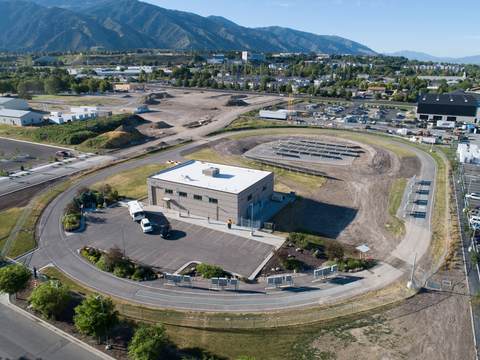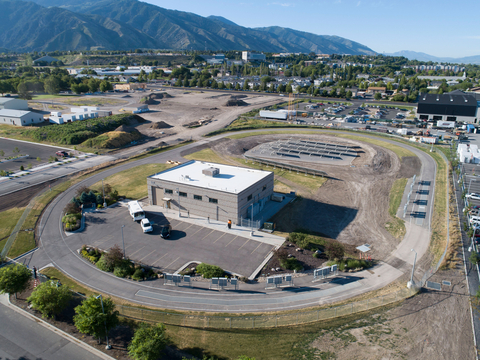LOS ANGELES & NORTH LOGAN, Utah--(BUSINESS WIRE)--Electreon (TASE: ELWS.TA), the leading provider of in-road wireless electric vehicle charging technology for shared, commercial and passenger vehicles, and Advancing Sustainability through Powered Infrastructure for Roadway Electrification (ASPIRE), a National Science Foundation-funded Engineering Research Center taking on the nation’s electrified transportation challenges to the widespread electrification of all vehicles, announced today they are launching a joint demonstration project. Electreon’s in-motion (dynamic) wireless charging technology will be installed in ASPIRE’s research test track in North Logan, Utah, in summer 2022 to showcase the company’s technology for the first time in North America. The launch of the test bed comes in advance of Electreon’s first deployment on a public road in the U.S. in 2023 in Detroit––a partnership with the Michigan Department of Transportation (MDOT), among many others.
The demonstration will consist of 50 meters of dynamic in-road wireless charging hardware installed in Utah State University’s (USU) test track. Corresponding vehicle side charging hardware will be installed on the Kenworth truck, and power management and charging communication systems will also be included. This site will function as a live demonstration facility for departments of transportation, other government officials, current and potential industry partners, as well as Electreon’s potential and prospective partners and clients to experience Electreon’s in-motion wireless charging as the technology moves to market deployment in the U.S. Electreon will also use this project as a test bed to conduct future vehicle integration programs with automakers. This project marks a significant advancement in Electreon’s and ASPIRE’s efforts toward providing sustainable mobility infrastructure for the nation and the world.
“So far, Electreon has already demonstrated its dynamic wireless charging technology in four operational pilots across Europe and now we are thrilled to kick off our first U.S.-based deployment with USU’s ASPIRE, displaying the viability of our in-road wireless charging infrastructure,” says Stefan Tongur, vice president business development for Electreon in North America. “We are excited at the prospect of advancing sustainable charging technology in hopes of supporting the U.S. movement toward an all-electric future. This project will allow us to engage with partners and clients to develop pilot and commercial projects in the whole nation and will allow for ongoing testing in advance of U.S. projects on public roadways, including the recently announced project in Detroit.”
This demonstration project collaboration with ASPIRE, in part, aims to validate dynamic wireless charging technology solutions for several upcoming pilot projects that include the Utah Inland Port Authority (Salt Lake City, UT), the Central Florida Expressway (Orlando, FL) and developing projects in several states across the nation.
“ASPIRE is excited to work with Electreon in demonstrating the electrified roadways of tomorrow,” said Regan Zane, ASPIRE Center Director. “The groundbreaking work that we are doing here exemplifies our commitment to creating solutions to the issues that are preventing us from electrifying transportation. We believe that our findings will provide the blueprint for the nation’s path to deep electrified vehicle adoption and resulting energy, economic and environmental benefits through low-cost ubiquitous charging infrastructure.”
Electreon and ASPIRE are also partnering on the demonstration project with Kiewit Corporation, one of the largest and most respected engineering and construction companies in North America. Kiewit will provide expert insight into installation and construction processes for electric roads.
“Kiewit is proud to continue our partnership with Electreon and ASPIRE for the deployment of this innovative technology,” says Mike Johnson, Kiewit Sr. Vice President of Infrastructure Markets & Strategy. “The ASPIRE demonstration will be essential in understanding construction considerations around installation and maintenance of dynamic and static inductive vehicle charging on public roads.”
The project also includes Kenworth Truck Company, which has delivered a Class 8 Kenworth T680 Classic to USU for the integration with the Electreon system at the test track.
“This collaborative effort offers an excellent opportunity to explore the potential of mobile wireless charging. We will discover the amount of energy actually generated from driving the Kenworth T680 over charging plates at various speeds, and collect data for possible real world on-road testing in the future,” said Ryan Reed, Kenworth Director of Research and Development in Renton, Washington.
Electreon is one of the only active dynamic charging solutions available on the market today with projects spanning worldwide including the electrified roadways charging 200 buses in Israel as well as other projects in Italy, Germany, Sweden and now coming to Utah and Michigan.
About Electreon
Electreon is the leading provider of wireless charging solutions for electric vehicles (EVs), providing end-to-end charging infrastructure and services to meet the needs and efficiency demands of shared, public and commercial fleet operators and consumers. The company’s proprietary inductive technology dynamically (while in motion) and statically (while stopped) charges EVs quickly and safely, eliminating range anxiety, lowering total costs of EV ownership, and reducing battery capacity needs—making it one of the most environmentally sustainable, scalable, and compelling charging solutions available today. Electreon works with cities and fleet operators on a charging as a service (CaaS) platform that enables cost-effective electrification of public, commercial, and autonomous fleets for smooth and continuous operation. For more information, visit electreon.com.
About ASPIRE
The ASPIRE Engineering Research Center was launched in September, 2020 with a $50 million, 10-year grant from the National Science Foundation with its main purpose to support widespread adoption of electric transportation through developing technologies and clearing barriers leading to low cost, ubiquitous charging infrastructure. One of the key aspects of the ASPIRE research portfolio is dynamic wireless power transfer, a research and development area where USU and its ASPIRE partner universities have led advances for many years. The ASPIRE university partners (Purdue University, University of Colorado Boulder, The University of Texas at El Paso, and University of Auckland, New Zealand) are joined by more than 60 industry, government, and non-profit members from all sectors of the electric transportation ecosystem. For more information, visit aspire.usu.edu.




